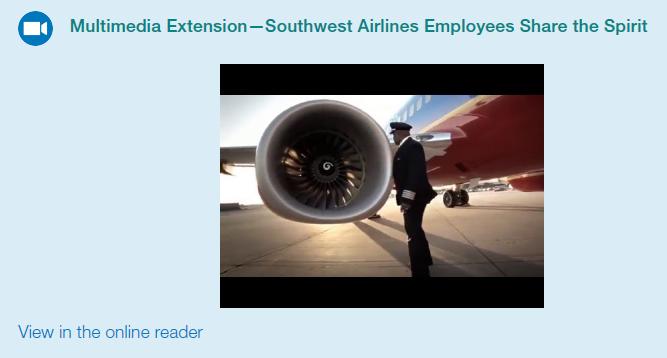Southwest Airlines was founded in 1967 with the intention of challenging the status quo in the airline
Question:
Southwest Airlines was founded in 1967 with the intention of challenging the status quo in the airline industry. The company emphasized simplicity by serving smaller airports, operating only one type of aircraft, issuing first-come-first-served boarding positions rather than seat assignments, and flying point-to-point rather than through hubs. The airline also modeled its maintenance crews after Indie 500 pit crews to expedite aircraft turnaround time. The company has enjoyed tremendous success, with 47 consecutive years of profitability. This streak was challenged by the drop in air travel in 2020 driven by travel restrictions, additional cleaning expenses, and keeping middle seats unoccupied in response to the global pandemic of COVID-19. Normally, Southwest Airlines employs over 60,000 people and serves over 130 million customers annually. The mission of Southwest Airlines is dedication to the highest quality of customer service delivered with a sense of warmth, friendliness, individual pride, and company spirit. Southwest makes it clear that it values employees above all else. One of the airline's founders is known to have said, "The business of business is people." Southwest has a strong set of values that help define its company culture. Employees are encouraged to "Live the Southwest way" with "Warrior Spirit, Servant's Heart, and Fun-LUVing attitude" (the company's stock symbol is LUV), and to "Work the Southwest way" by emphasizing "Safety and Reliability, Friendly Customer Service, and Low Costs." The philosophy of Southwest Airlines is that happy employees will lead to happy customers, which will translate to financial success and happy shareholders. The company embodies this emphasis on employee satisfaction in many ways. It has a department of Culture Services whose mission is to retain focus on the company's values, it recognizes and celebrates leaders at every level of the organization, it includes employees in decisions by empowering them to participate and own decisions that will impact them (such as designing new uniforms), and it offers ample opportunities for customers and coworkers to acknowledge exceptional staff. Other employee perks include substantial profit sharing, donations to employee-chosen non-profits, dinners with company executives, tuition reimbursement, professional development opportunities, and a fun and quirky work environment that supports individual expression. When it comes to power, these positive organizational features make it easier for those within the organization to rely on referent power (liking and respecting someone), expert power as the organization listens to employees, and reward power as the organization shares its success with employees.
This investment in employee happiness has clearly paid off. Southwest Airlines enjoys an exceptionally low voluntary turnover of 4%, 85% of its employees say they're proud to work for the company, and the airline has the lowest number of customer complaints in the industry. Of course, the pandemic of COVID-19 has shaken up airlines and it is unclear which will survive the dramatic downturn in domestic and international travel which began in May 2020. The 9,000 corporate headquarters employees are primarily working from home with reports being as high as 98% through 2020. Southwest CEO, Gary Kelly, remains optimistic that Southwest will survive.
Questions
1. What is unique about Southwest Airlines, either operationally or from an organizational behavior standpoint? Do you think culture influences operations, and vice versa?
2. How does employee happiness relate to organizational success? Do you think Southwest’s prioritization of its employees sets it apart in the industry?
3. What role do you think power and influence play among employees at Southwest?
4. Do you think that an organization like Southwest Airlines has more or fewer politics throughout it compared to a more hierarchical organization? Please be prepared to defend your answer.
5. Would you want to work for a company like Southwest? If so, what about the company most appeals to you?
Step by Step Answer:

Essentials Of Organizational Behavior Bridging Science And Practice
ISBN: 9781453339244
1st Edition
Authors: Talya Bauer, Berrin Erdogan





